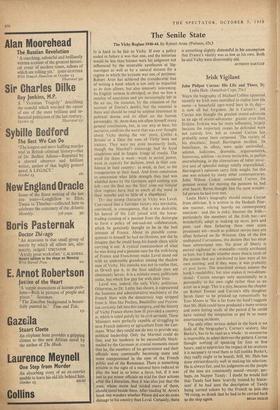Irish Vigilant
WHEN the biography of Michael Collins appeared, recently we Irish were mortified to realise how his name—a household ogre-word here in its, day— is now all but forgotten. So is Curran's : yet Curran was thought the greatest orator-advocate in an age of orator-advocates: greater even than Erskine. Erskine was far more influential, largely because the important causes he defended were not entirely lost; but as counsel Curran has probably never been surpassed. 'The variety of his elocution,' Jonah Barrington recalled, 'its luxuriance, its effect, were quite .unrivalled: solemn, ludicrous, dramatic, , argumentative, humorous, sublime—in irony invincible, in pathos overwhelming, in the alternations of bitter invec- tive and of splendid eulogy totally unparalleled.' Barrington's opinions carry little weight, but this one was echoed by many other contemporaries. John Wilson Croker considered Curran, the greatest orator for moving the passions he had ever heard; Byron thought him the most wonder- ful person he had ever met, Leslie Hale's biography should rescue Curran from oblivion. It is written in the Hesketh Pear- son manner, relying heavily on contemporary anecdote : and this is risky, because. the Irish— particularly the members of the Irish bar—are wonderfully adept at making up mots, jests and puns and then . fathering them onto some prominent wit—much as political stories here are often fathered on Sir Winston. One of the few undisputed Curranisms, the dictum that has since been abbreviated into 'the price of liberty is eternal vigilance' is—ironically—rarely attributed to him; but I doubt whether more than la tenth of the stories that are attributed to him were of his own minting; and if they were, it was probably ex post facto. The anecdotal stream assures the book's readability, but also makes it two-dimen- sional: Curran emerges only occasionally as •a personality in his own right rather than as an actor on a stage. This is a pity, because the chapter on Robert Emmet and Curran's silly daughter Sarah (later to be prinked up romantically by Tom Moore in 'She is far from the land') suggests that-Mr. Hale could have produced a more serious and more lasting study of the period if he could have resisted the temptation to put in so many entertaining incidents.
The only other serious defect in the book is no fault of the biographer's. Curran's oratory, like Burke's, has to be read as a whole : to summarise is impossible, to select destroys the pattern. Curran thought nothing of speaking for four or five hours; and to appreciate the impact of his orations it is necessary to read them in full (unlike Burke's, they really ought to be heard). Still, Mr. Hale has done extraordinarily well in making his selection. He is always fair, and his judgments on the people of the time are consistently sound—except, per- haps, on Napper Tandy : I doubt he would feel that Tandy had been `scurvily treated by histor- ians' if he had seen the description of Tandy being carried ashore by the French to join the '98 rising, so drunk that he had to be carried back


















































 Previous page
Previous page